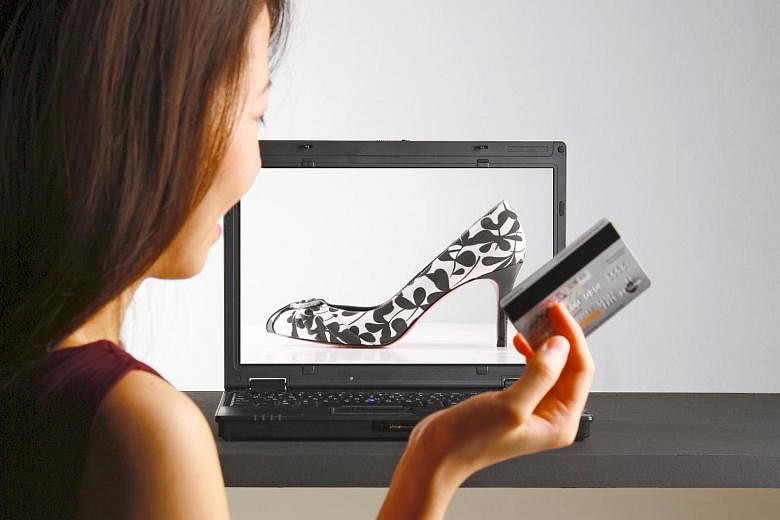Going cashless is part and parcel of modern living.
Today, many people carry more than one credit and/or debit card as they offer various benefits and discounts.
The last I checked, I have eight credit cards in my wallet.
I use one that has a tie-up with Esso for petrol purchases, as it gets a bigger discount.
The rest help me chalk up air miles, accumulate reward points and enjoy cash rebates.
Boosted by breakthroughs in mobile payments, online shopping and paying via the Internet for services such as transportation and travel accommodation have gained great popularity.
Over the past year, people have been able to save credit card details in, say, taxi-booking and shopping apps, making it more convenient to pay.
While paying with plastic is convenient, users should be aware of the different fees and charges, as well as be prudent about the way they manage details of their cards.
Here are six things to look out for.
INTERNATIONAL TRANSACTION FEE
Such fees, also known as international service assessment fees, are not new.
Still, many Uber customers here were caught off guard when they realised that, although they paid for their rides in Singdollar using locally issued cards, the payments are processed overseas, making them foreign transactions.
Uber is headquartered in the United States.
This attracts a small additional charge of about 1 per cent or less of the fare, which does not show up in Uber e-mails to passengers after the rides but appears on the credit/debit card statements, usually a month later.
This charge also shows up when you make a purchase here on a website or app that appears to be hosted by a Singapore merchant.
The fee is charged by credit/debit card firms (for example, Visa and MasterCard) to the card-issuing bank whenever the payment is processed overseas, regardless of whether the purchase is in Singdollar or foreign currency.
As your purchases make their way around the world to your doorstep, your payment also travels around the world to reach your merchant.
The card-issuing bank may pass on the fee to the cardholder.
The charging of such foreign transaction fees (with or without mark-up) by the bank to the cardholder can be found in the terms and conditions governing the use of the credit/debit card.
As such, whether you choose to pay for your online purchases in local or foreign currency, the international transaction fee will be charged by your card issuer if the payment transaction is processed overseas.
For transactions made in foreign currency, you will typically see one amount in foreign currency and one amount in Singdollar reflected in your credit card statement.
The final amount that you see in Singdollar would include any foreign exchange fee, international transaction fee and any other applicable administrative fee charged by the card-issuing bank.
To determine if an additional foreign transaction fee would apply, you can verify with the merchant and the bank, as well as check the terms governing the use of the credit/debit card.
Do factor in the additional international transaction fee when comparing purchases among merchants.
OTHER FEES
Other charges related to the credit card and the supplementary card include an annual membership fee, late payment fee and finance charges. These days, it is common for most card-issuing banks to waive the annual fee at the customer's request.
Be prudent and pay your bills on time to avoid the late payment fee and finance charges.
The former is imposed if you fail to pay at least the minimum sum by the payment due date.
Finance or interest charges of 24 per cent a year of the outstanding balance are levied if it is not paid in full by the payment due date, even if you have made a partial payment.
The amount can be substantial if you roll your balance over an extended period.
CURRENCY CONVERSION
Most customers wonder what exchange rate is used to convert the cost of an item bought overseas or online with prices in foreign currency.
It is the card-issuing bank that converts transactions overseas or online charged in a foreign currency to Singdollar.
The exchange rates used to convert these transaction sums into local currency may vary day to day and from bank to bank.
It is worth your while to check with your card issuer on how the conversion is calculated and if there are other administrative charges factored into the final Singdollar amount in your statement.
TRANSACTION ALERTS
When your card issuer alerts you on a big-ticket purchase, it is likely that this is a card transaction that has exceeded a pre-defined threshold.
Check with your bank on the current transaction-alert threshold set for your payment card.
You may wish to adjust the threshold according to your comfort level.
You may even request to be alerted for all transactions charged to your payment card.
SECURITY
Beware of falling prey to online and phishing scams which are on the rise. Cyber experts advise that online transactions should be done only over a proper and secured channel.
You should never reveal your credit card details to an unidentified third party.
For instance, if you receive an e-mail supposedly from the online store asking for your details after a transaction via your credit card, it may be a phishing e-mail out to scam you of your money.
Contact the merchant or your card issuer directly instead.
CARD-FRAUD PREVENTION
Shop at reputable and legitimate merchants, and check if the merchant is using a secured website, where its address is "https:" instead of just "http".
To minimise chances of malicious codes, worms or viruses being loaded into your computer, ensure that its firewall, anti-virus and anti-spyware applications are updated.
Clear your cache after a shopping session to ensure that no confidential information is stored in your computer.
Another useful advice is not to perform online transactions using computers in public places such as cybercafes, where your personal information is at a greater risk of being exposed and used.


